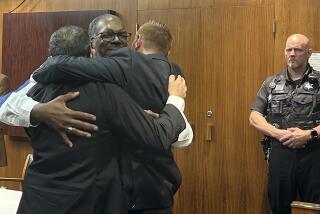Inglewood to Pay $750,000 in Death of Man Restrained by Police
- Share via
The Inglewood City Council has agreed to pay $750,000 to settle a lawsuit by the family of a 19-year-old college student who died from neck injuries suffered as he struggled with police after a Grateful Dead concert at the Forum in December, 1989.
Inglewood police said they used a carotid artery chokehold--a controversial form of forceful restraint banned by many law enforcement agencies because of concerns about serious injury--to control Patrick Shanahan after he resisted attempts to arrest him.
The Los Angeles County coroner’s office concluded that the Orange County man died from “compression of the neck during restraint.” Listed as contributing factors in Shanahan’s death were “multiple injuries and acute LSD intoxication.”
Witnesses said they saw police officers beating Shanahan with nightsticks, and the coroner’s office said bruises were found on his forehead, neck, scalp, cheek, jaw, shoulder, chest, ribs, knee and back.
But Inglewood police denied that excessive force was used, and the district attorney’s office cleared them of any wrongdoing in the UC Santa Barbara student’s death.
According to police, an officer on patrol after the concert on Dec. 10, 1989, spotted Shanahan standing rigidly with a blank stare on his face.
The officer said Shanahan failed to respond to questions and dropped to his knees, yelling and laughing to himself.
The policeman said that when Shanahan resisted efforts to arrest him, backup officers were called and he was wrestled to the ground. Police said that when Shanahan broke free, one of the officers “placed him in a carotid control hold.”
Police said they were en route to the station with Shanahan in the back seat of the patrol car when they noticed he had stopped breathing. They took him to Daniel Freeman Memorial Hospital, where he was pronounced dead.
Several months later, Shanahan’s family filed a wrongful-death suit against the city of Inglewood.
On Tuesday night, without any admission of wrongdoing by the city or its employees, the City Council authorized the $750,000 settlement.
More to Read
Sign up for Essential California
The most important California stories and recommendations in your inbox every morning.
You may occasionally receive promotional content from the Los Angeles Times.









